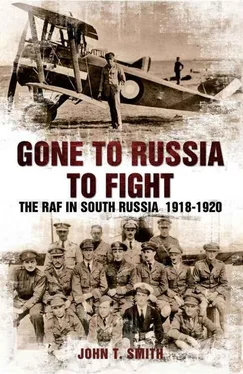The Volunteer Army was holding the area around Ekaterinodar and Novorossisk in the north-west of the Caucasus, facing the Red Caspian-Caucasus Army Group. This was made up of the 11th Army, facing westward, and the 12th Army, facing south towards the Terek Cossacks, who held the area around Petrovsk on the Caspian. At the start of January, General Denikin’s forces attacked the 11th Army, breaking through the centre of their line, which had run from the lower reaches of the Caucasus Mountains north into the steppes.
On paper, the 11th Army had been a strong force, with around 150,000 troops, but they had been considerably weakened by disease and low morale. The supply line for the 11th Army back to the Soviet heartland was tenuous, stretching through Astrakhan and north along the Volga. At this stage, the Volunteer Army was mostly a genuine volunteer force, with high commitment and considerable experience. Spearheaded by General Wrangel’s 1st Cavalry Division, the White forces could only field 25,000 fighting men. But this was enough to break the 11th Army, and Wrangel advanced along the rail line that runs south-east to the Caspian. Piatigorsk, which was the capital of the North Caucasus Soviet Republic, fell on 20 January. The Terek Cossacks attacked north and drove the Red 12th Army back towards Astrakhan. General Wrangel was given command of all the forces in the north Caucasus region.
On 1 January, SS Riviera entered the Black Sea carrying the first batch of men and aircraft of 221 Squadron. D. B. Knock described the trip across the Black Sea:
2/1/19 Worked the middle Watch, 12 to 4am, in bunkers shovelling coal. The war is over and all the duration men are growling. Better make the best of it and see what’s coming.
3/1/19 Pulled into Batum harbour 10am. Snow capped Caucasus ranges frown over town in distance. Magnificent sight. Transport landed after ship tied up and CO [J. O. Andrews] orders me to get Ford ready for use. CO says will drive himself. Leaving jetty I go to jump out to open wide wooden gate onto road. CO snaps, ‘Know my own judgement. I can easily get through there.’ Takes it at 30mph and a rending crash sings the swan song of the port front mudguard. Difficult to restrain my inward mirth, but succeed. Out into town… Found military HQ. Whilst CO saw staff wallahs I got around handy and snagged a good meal from a cookhouse. [1]
Major Andrews’ description of the arrival at Batum does not mention his accident with the Ford:
The aircraft were quickly transferred to railway trucks at Batum whilst a visit to the (British) army HQ to obtain Intelligence and maps, proved fruitless. No maps were available. The squadron photographer made photographic copies of such maps as the army had, and the squadron proceeded leisurely across the Caucasus to Baku. The majority of the populace appeared averse to compulsory deliverance from the Red yoke, and consequently guards were mounted at each end of the train with rifles and Lewis guns. At every halt these detrained and took up positions, one each side of the train. [2]
Lieutenant Gayford was also on the train as it travelled across Transcaucasia:
At Batum the aircraft were wheeled off the carrier and straight up on to flat railway trucks, their appropriate wings and empennage being lashed alongside. All personnel were accommodated in Russian 3rd Class carriages, an excellent type of vehicle for long railway journeys. It had tree tiers of bunks, which can be folded down out of the way during the day. Our journey eastward across the Caucasus to Baku on the Caspian was a slow one, the line going West being congested with train loads of Turkish troops and repatriated prisoners returning to Turkey. [3]
The local population throughout the Caucasus was divided into numerous factions, including Georgian, Azerbaijani, and Armenian nationalists, supporters of the Soviet government and the White forces, plus many who just wanted to be left alone by everybody. Many of the groups making up the local population resented the arrival of the British forces in the area. The trip across the Caucasus was not without incident for Knock:
6/1/19 5pm train moves off. Steady gradient always climbing. When train stops, two must climb out and patrol the length of the train, one each side, with one in spout and fixed bayonet. 2am train stops and I am due for duty. Clamber out. Freezing cold and snow everywhere… Wild looking surroundings. Creepy. Lofty Blake on other side of train. [4]
Knock was very nearly left behind when the train started off without warning. If he had been, he would have been lucky to survive the cold and the local inhabitants. As the journey continued, he turned once more to his diary:
Late afternoon passed through Tifflis, after brief halt. Wonderful Caucasian scenery, in which I revel.
7/1/19 Bowling through rolling plains and see two individuals with revolvers firing in direction of train. As it is my guard duty period, I let one round near them to scare them off. CO hears shots and enquires. Threatens me with close arrest, but as bullet holes were found through two Nine Ack [DH9A] fuselages hear nothing more about it. Those chaps must have been Bolsheviks.
9/1/19 Pass through country drab in colour and dotted with oil derricks. At 6pm we pull into Baku on the Caspian Sea. [5]
Although the British controlled the area around Baku, the numbers of British troops involved were never large enough to do more than have a presence in the major towns. The relations between the British and the various groups of locals, apart from the White forces the British had come to support, were never other than strained. Gayford recorded the following description of Baku:
Baku was indescribable confusion, and the whole political situation was changing almost daily, so having learned nothing we continued our journey to Petrovsk. Enroute we stopped at Derbent and were somewhat shaken to experience for the first time, what we were to get more accustomed to later, Cossack hospitality. They were astonished when we would not stay and continue the party indefinitely but said that we must go on at the scheduled time. [6]
The Terek Cossacks were based around the Terek River and were in the process of driving the Red 12th Army back towards Astrakhan. Petrovsk, the intended base for 221, was a small port on the Caspian, just north of the Caucasus Mountains. At the time the squadron arrived there in January, they were close to the front lines and were isolated in an area where many different groups still continued to fight. Knock described the journey to Petrovsk:
11/1/19 Train pulls out. Destination Petrovsk, a port about 250 miles North. Stop at a place called Derbent, where mayor and satellites hand out eatables. Good feed of roast goose.
12/1/19 Arrive Petrovsk. Unload equipment and billeted in old school at place three miles from town called Petrovsk Kavkaski. Fair ground for ’drome here. [7]
Lieutenant Gayford also recorded his first impressions of Petrovsk:
On arrival at Petrovsk we found an excellent site for an aerodrome on the outskirts of the town with a railway siding running right onto it… We ran our train up onto the aerodrome site, and wheeled the aircraft off and erected them. The weather was bad, snowstorms and gales. Also there were no hangars. We built a screen facing South East to give the aircraft and mechanics working them some protection. [8]

Panorama of the airfield at Petrovsk, showing the fence that was built to provide shelter.
By January, the northern part of the Caspian was frozen over and the wind blowing across the ice was freezing cold. Major Andrews was faced with a Herculean task to get the aircraft serviceable, to create the organisation for a fighting squadron, and to look after his men in severe conditions. In Baku, he had been issued with what he described as a chest filled with the local currency, and he put this to good use:
Читать дальше













